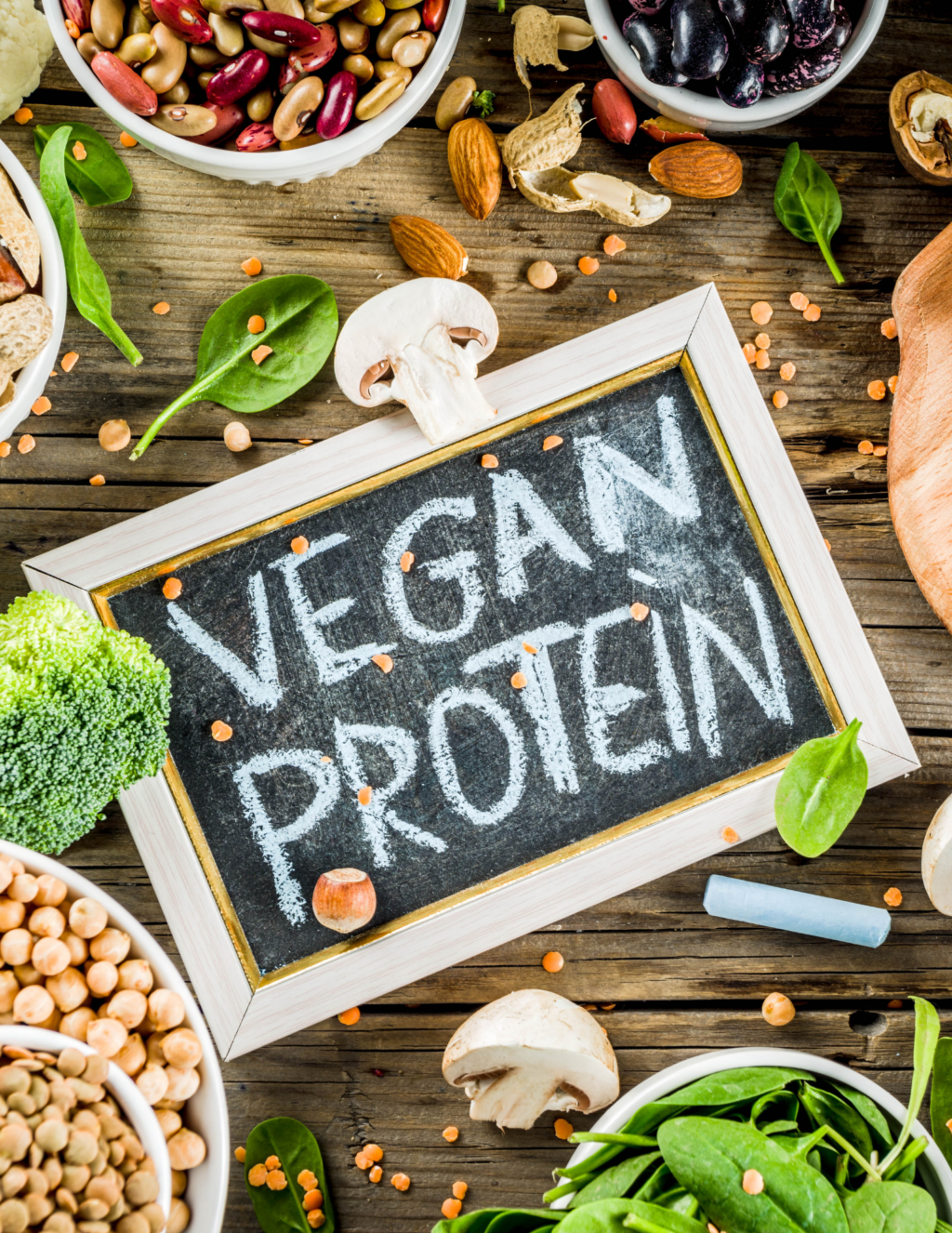Vegans cannot get protein. It’s just impossible… isn’t it?
If you are new to a vegan way of life, then this is a completely normal concern – after all, protein is such a crucial nutrient. Luckily, getting protein as a vegan isn’t actually that difficult. In fact, it’s pretty simple.
Just ask any high-profile plant-based athlete, including Novak Djokovic, Patrik Baboumian, Venus Williams, Scott Jurek, and Hannah Teter to name a few. Even Arnold Schwarzenegger is moving towards a more vegan lifestyle and is now considered almost completely plant-based.
The question of getting enough protein may be settled, but where do vegans get their protein?
That’s what we will explore in this article.

Table of contents
Why is Protein So Important?
Protein is a much talked-about nutrient, but why is it so important?
In short, it keeps our skin, hair and nails in good form, our muscles plump, and our bodies healthy.
Protein is one of the three macronutrients in our diet, alongside carbohydrates and fats. It’s broken down into amino acids and used by the body as building blocks to create, maintain, and repair muscle and bone, as well the things we don’t see, such as enzymes and immune system chemicals.

How Much Protein Do We Need?
In general, studies show that adults need no more than 0.8g-1.0g of protein per kilogram of bodyweight per day. So, somebody weighing 150lbs will need around 54g of protein per day.
However, if you are training hard, have a physical job, are injured, or are sick, you will often need to eat more protein – closer to 1.6g-2.2g per kilogram of bodyweight.
The specific number entirely depends on the individual (activity levels, goals, age, weight, etc.), so it’s always best to consult a dietitian or nutritionist to get personalized recommendations.
You will also often need to consume more protein if you are older, as we digest protein less effectively as we age.

What About Amino Acids?
For a protein to be branded a ‘complete protein’ it has to include adequate amounts of all nine essential amino acids (EAA) – those amino acids that the body cannot produce by itself and therefore requires from your diet.
The good news is that research shows that all plants contain all nine EAAs. The slightly less good news is that the levels of these amino acids vary.
This simply means that relying on a single plant for all nine EAAs isn’t a smart move, as you may become deficient in a particular one.
Therefore, the best strategy for someone following a plant-based diet is to not stick to a single protein source. Instead, eat a good mix of plant-based protein sources to ensure you are getting adequate levels of every essential amino acid.

What are the Best Protein Sources for Vegans?
Pretty much all food contains some degree of protein – even broccoli and asparagus. However, some foods are certainly more protein-rich than others, and these are the foods you should consume more of if hitting your protein goals is important.
So, which vegan foods are high in protein? Here are some of our favorite protein sources to incorporate into your daily diet.

Tofu
8g protein per 100g
Soy products are an invaluable part of any vegetarian or vegan diet, and tofu is seen as the king of the soy products!
Carrying 8g of protein per 100g, tofu is a very lean source of protein and considered a complete protein.
It’s also a very versatile product, as you can fry, scramble, bake, grill, barbecued, or use it as an ingredient in sauces or desserts, depending on if you use silken, firm or extra-firm tofu.
Another plus is that tofu is essentially tasteless. This means it is able to take on flavors of marinades, sauces and seasonings easily.
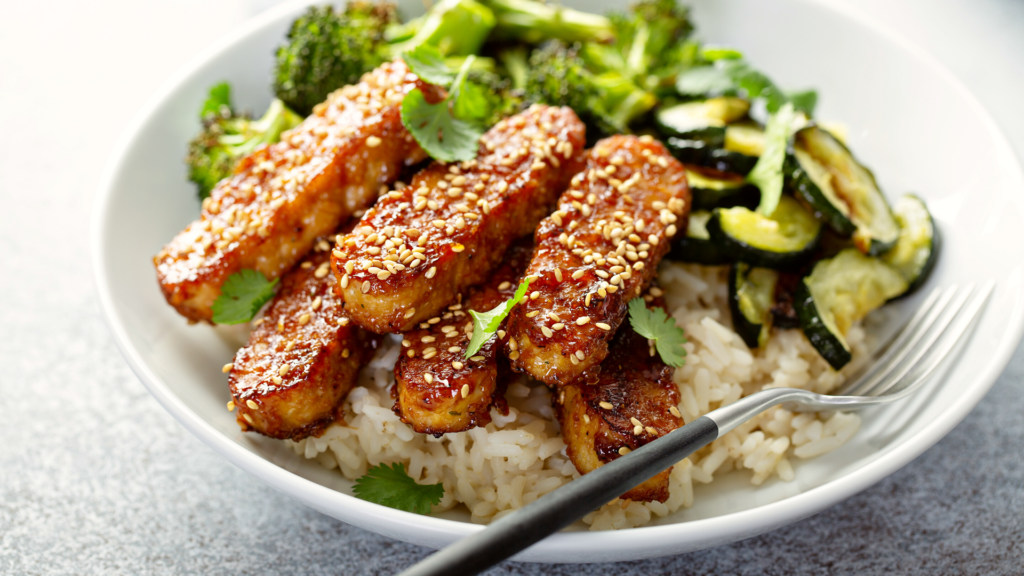
Tempeh
19g protein per 100g
Tempeh is tofu’s nuttier sibling – a less processed version of tofu made with fermented soybeans.
Although it may not match tofu in terms of versatility, tempeh boasts a higher overall protein content, and is a great replacement for meat in some dishes due to its firmer texture.
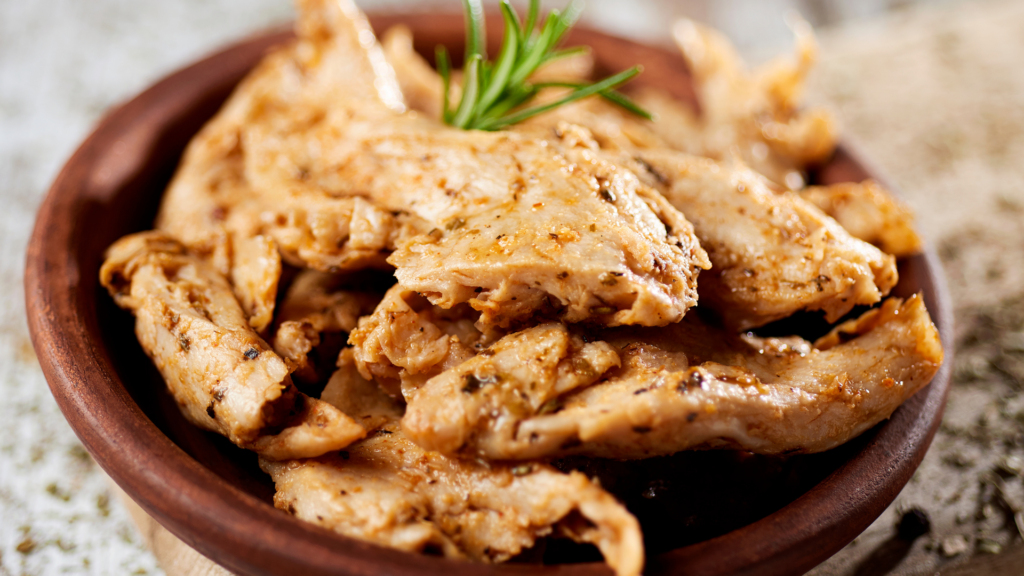
Seitan
25g protein per 100g
Seitan is a powerhouse of plant-based protein, offering a whopping 25g of protein per 100g.
This versatile meaty substance is made from wheat gluten, so it is definitely not suitable for people suffering from celiac disease and those following a gluten-free diet.
With a satisfyingly chewy mouthfeel, seitan is perfect for replacing any kind of meat, and you can often buy it in the form of burgers, sausages, bacon, ground beef, and so on.
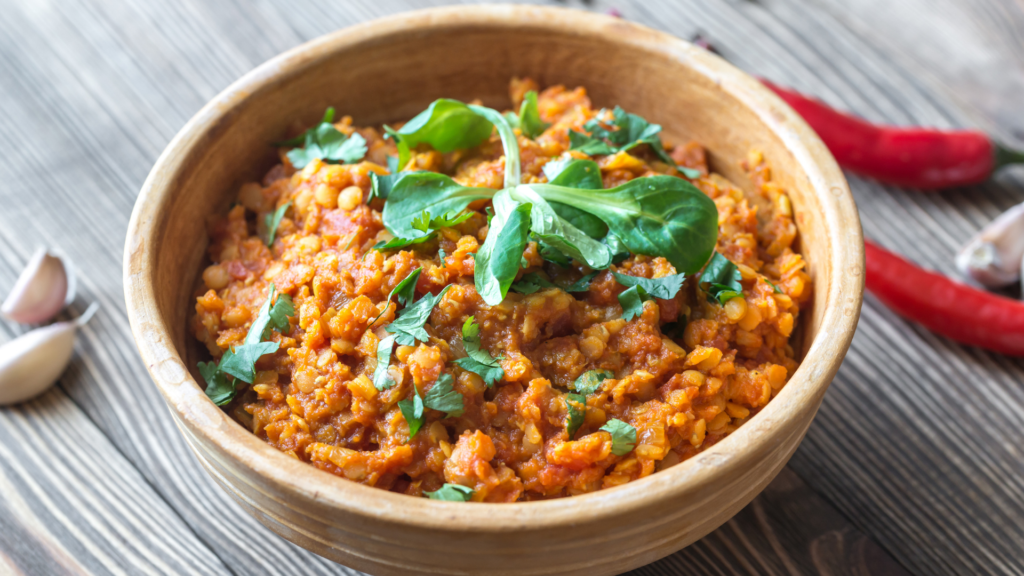
Lentils
9g protein per 100g
Lentils are another high-quality plant-based protein source containing a respectable 9g per 100g of boiled lentils. In addition, they are packed with fiber, vitamins and minerals (particularly folate and potassium).
Due to their high protein and fiber content, lentils are very satiating. This means they will provide you with a satisfyingly full feeling without having to overeat.
Lentils are a versatile ingredient and can be used in everything from stews to Buddha bowls. Green lentils are particularly good for salads, while red lentils are ideal for chilis and wintery dishes.
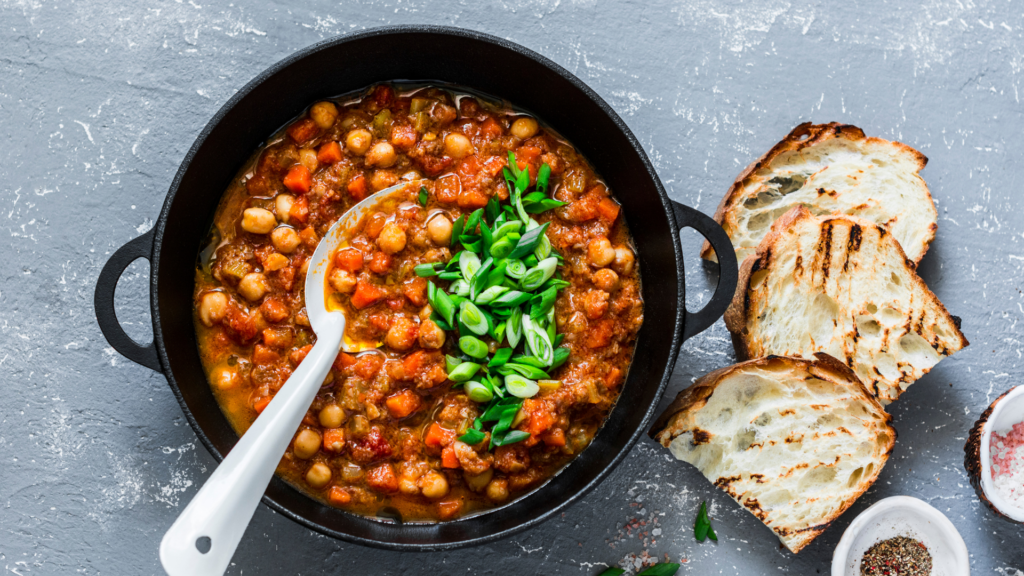
Chickpeas
9g protein per 100g
With around 9g of protein per 100g serving of cooked chickpeas, these little legumes are comparable to both lentils and tofu in terms of protein content.
When it comes to uses, chickpeas are so versatile. They can be your protein source in curries, stews and chilis, blitzed into hummus, or mashed into chickpea tuna for an epic sandwich filling.
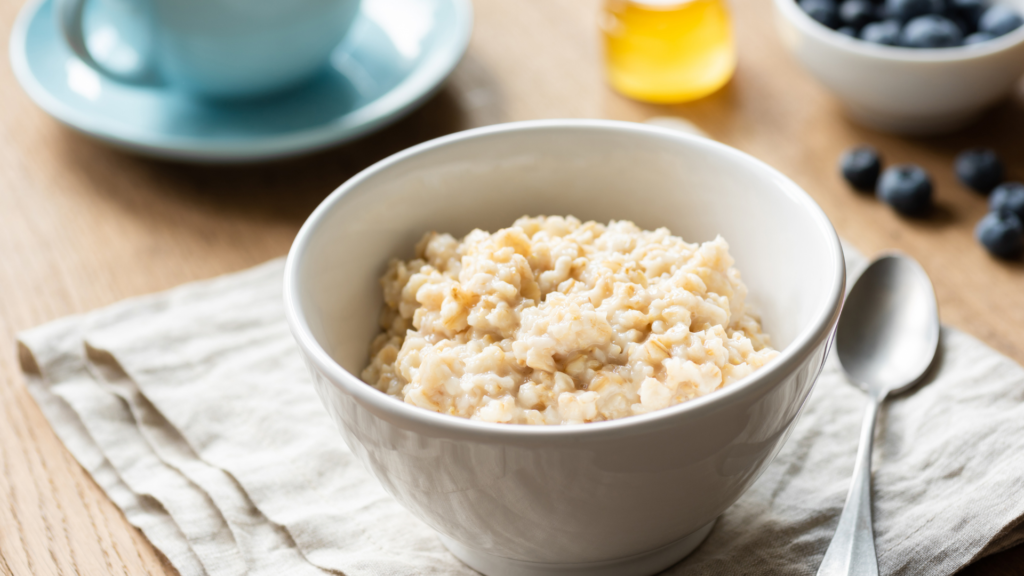
Oats
14g protein per 100g
It’s hard to overlook oats, which provide 14g of protein per 100g, as well as tons of fiber, vitamins and minerals.
They are also stacked with carbohydrates, so make a great choice for breakfast and pre-workout snacks. We love to use oats for baking – they make a great base for chocolate chip oatmeal cookies.

Hemp Seeds
33g protein per 100g
With 33g of protein per 100g, hemp seeds are an excellent protein source for vegans. While it may be difficult to eat that portion size in one sitting, these nutty little seeds are a must-have for your store cupboard.
They are great sprinkled onto salads, smoothie bowls and desserts, as well as mixed into a variety of recipes like homemade protein balls to add a protein kick and creamy texture.

…and not forgetting the rest!
Beans (including pinto, black-eyed, edamame, butter, cannellini, and kidney) – between 7g and 10g protein per 100g
Garden Peas – 7g protein per 100g
Peanuts – 26g of protein per 100g
Almonds – 21g of protein per 100g
Cashews – 15g of protein per 100g
Chia seeds – 16g protein per 100g
Pumpkin seeds – 30g protein per 100g
Sunflower seeds – 19g protein per 100g
Quinoa – 14g protein per 100g
Amaranth – 14g protein per 100g
Sorghum – 8g protein per 100g
Spelt – 5g protein per 100g
Whole wheat pasta – between 11g and 15g protein per 100g
Chickpea flour – 22g protein per 100g
Almond flour – 21g protein per 100g
Nutritional yeast – 51g protein per 100g
Spirulina – 55g to 65g protein per 100g
Soy milk – 6g protein per 1 cup (240 ml)
Pea milk – 8g protein per 1 cup (240 ml)

Remember that the protein contents in some of these foods will depend on how they are prepared as well as the brand you buy.
Finally, don’t forget things like plant-based meat alternatives, as these are often very high in protein. However, while they usually have similar protein contents to the meats they are substituting, they are also often highly processed with a considerable amount of salt, so use sparingly.
What Are The Best Protein-Rich Snacks For Vegans?
I know toward the beginning, it can sometimes feel like you’re munching on the same snacks over and over again. This is common when starting any new way of eating.
The good news is, with time we came across so many more options to choose from!
Here are our 14 favorite protein-rich snacks:
- Rice cakes with nut butter
- Chia pudding
- Soy yogurt with fruit
- Homemade granola
- Homemade trail mix
- Chickpea cookie dough
- Energy bars/balls
- Hummus with veggies or bread
- PB & J on whole grain bread
- Protein shakes that include things like soy milk, nut butter, and seeds
- Any bean dip with veggies or healthy crackers
- Edamame
- Protein chocolate mousse (made with tofu as the base)
- Crunchy roasted chickpeas
When you think about it, that’s a new snack every day for 2 weeks. Not too bad, eh?
That’s plenty for you to get your teeth stuck into!
What’s your favorite plant-based protein?

